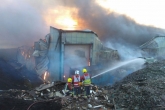Hadfield closes doors due to ‘unworkable’ fire regulation
Hadfield Wood Recyclers (Hadfield) has temporarily stopped accepting inbound waste wood at two of its sites to avoid enforcement action from the Environment Agency (EA), the company has said.

The EA had said that it would have to take enforcement action against the company unless it complied with new guidance for the storage of combustible materials, known as the Fire Prevention Plan (FPP), at its Middlesbrough site.
However, the company has said that the FPP guidance is “completely unworkable” for large-scale operators, and therefore decided to temporarily shut its gates to all customers at its UK Wood Recycling (UKWR) site in Middlesbrough last Thursday (23 July) to prevent enforcement action from being taken.
The company has also stopped accepting low-grade wood at its main recycling facility in Manchester, but its third site, in Tilbury, Essex, is still receiving waste wood as normal.
According to Hadfield, the closures mean that several thousand tonnes of waste wood will have to be diverted to other outlets or sent to landfill with immediate effect.
FPP regulations ‘unworkable for the biomass industry’

The company currently holds a contract to treat 35,000 tonnes of waste collected by Viridor every year on behalf of the Greater Manchester Waste Disposal Authority (GMWDA). The contract was extended by five years in 2014.
On top of this, Hadfield also has a contract to provide Sembcorp Utilities, the managers of the Wilton 10 biomass power station, with 1,000 tonne batches of biomass fuel from the UKWR site.
However, Hadfield states that the new FPP rules, issued in March, mean that stacks of unprocessed wood must be a maximum of 167 tonnes, and processed wood 33 tonnes. This, says Hadfield, is ‘much less than the previous guidance’ and not enough to fulfil the Wilton contract.
A statement on the Hadfield website adds that ‘small stack sizes will make any large scale operations such as [the UKWR] unworkable because of the scale of waste wood that needs to be stored to meet contract demands’.
The company also feels the guidance will ‘make it impossible for any of the UK’s biomass boilers to operate going forward’.
Further measures in the FPP limit the storage of combustible materials to six months, which Hadfield says is ‘unpractical’ for biomass operators due to the seasonality of wood flow.
Hadfield has highlighted that the new FPP guidance does allow wood processors to develop and adopt a Bespoke Fire Plan if it can demonstrate that it is equivalent or superior to that of the FPP. The company has reportedly spent £250,000 over the past 18 months improving the UKWR site and has installed a fire and heat detection system, fixed water cannons, and additional fire monitors and hoses, working in conjunction with the Cleveland Fire & Rescue Service.
In addition, in January UKWR leased seven acres of land adjacent to the Middlesbrough site to provide extra storage for waste wood but is reportedly still awaiting a decision by the EA to extend its current waste permit.
According to a Hadfield statement, the EA will not agree an extended permit until the main UKWR site complies with the storage guidance of the FPP and has also prevented the company from moving wood to the new site.
Hadfield ‘working hard to reach an agreement’
Geoff Hadfield, Managing Director of Hadfield Wood Recyclers and UKWR, said: “We have been working with the Environment Agency at a local and national level for number of months to try to reach an agreement on the Bespoke Fire Plan we have submitted for UKWR, but unfortunately that has not been possible to date. We were therefore left with no other option but to close the gates.
“We will continue to work with the EA to hopefully resolve this situation as soon as possible and hope to reopen our gates at both sites in the very near future.”
An Environment Agency spokesperson said: “Our role as a regulator is to ensure that permits protect the local community and the environment. An important part of this role is making sure that all appropriate measures are being taken to prevent fires.
“We also recognise that it is impossible to completely prevent fires and so, we need to be satisfied that operators have in place adequate control measures to minimise both the risk from fire and also the impact on the local community.
“We are aware of Hadfield's and UKWR's decision not to accept any more waste wood onto their sites. This is the first step towards reducing the risk and we hope that the company continues to work towards actively reducing the risk of fire.”
Wood Recyclers’ Association questions ‘seriously flawed’ FPP
Hadfield’s position has been backed by Andy Hill, Chairman of the Wood Recyclers’ Association (WRA), – of which Geoff Hadfield is a Founder and former Chairman –who stated earlier today (31 July): “Permitted sites are required to abide by regulatory guidance, but the WRA believe[s] that the stack sizes for wood in the Fire Prevention Plan document are commercially unrealistic.
“[The WRA] wrote to Harvey Bradshaw, the Environment Agency’s Head of Regulated Industry, earlier this year to complain about the sudden introduction of the FPP document, warning it that the FPP was ‘seriously flawed’ and would ‘needlessly damage and even destroy’ existing compliant businesses if implemented in its current form.
“The WRA are working closely with the Chief Fire Officers Association, London Fire Brigade, the Environment Agency, the Waste Industry Safety and Health Forum (WISH), the Environmental Services Association and Stobart Biomass to expedite planned practical fire tests. [These] are designed to give scientific evidence about how fires start and develop in waste wood stacks. This evidence will inform and support future regulatory guidance that protects against fire but that is also commercially viable.”
He added that the EA had “always been aware of these impending tests” and therefore the WRA does “not understand why the Environment Agency did not wait until the fire tests had been completed before issuing the new FPP document”.
Find out more about the Environment Agency’s Fire Prevention Plan.










